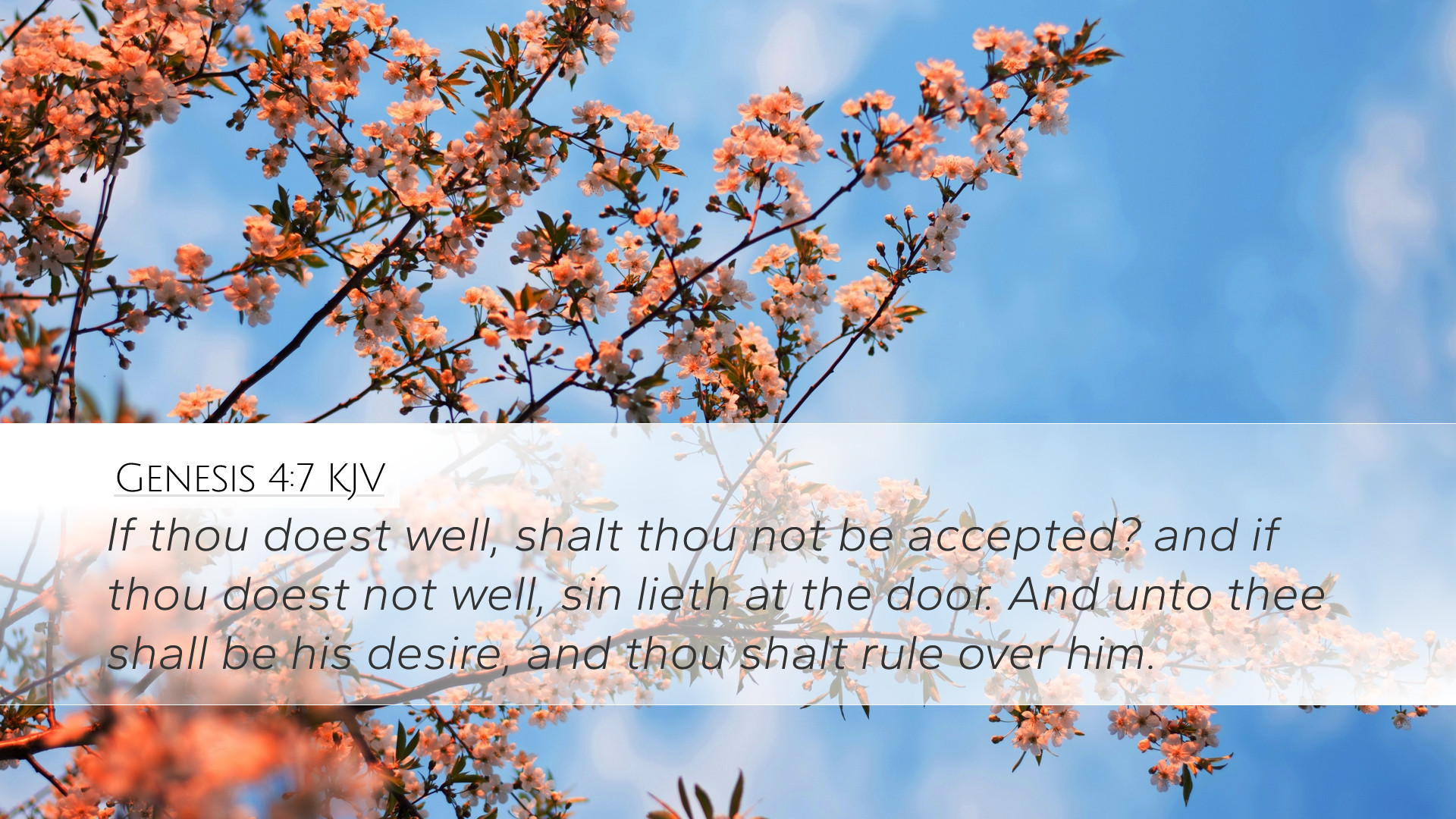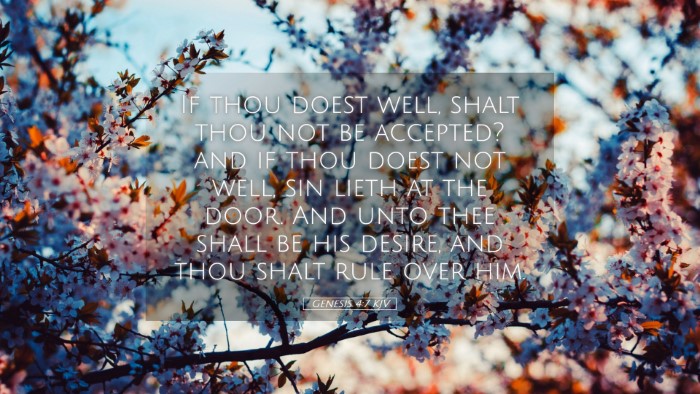Commentary on Genesis 4:7
Bible Verse: "If you do well, will you not be accepted? And if you do not do well, sin is crouching at the door. Its desire is for you, but you must rule over it."
Introduction
This verse speaks to the heart of moral choice and divine expectation. It is a dialogue between God and Cain, which highlights the theme of sin's presence and the requirement of moral governance in human life. The insights from various public domain commentaries shed light on the theological, ethical, and pastoral implications of this profound statement.
The Context of the Verse
Genesis 4:7 occurs within the narrative of Cain and Abel. Cain's anger and subsequent actions stem from God’s acceptance of Abel's offering over his own. As the first instance of human conflict, the verse sets the stage for understanding sin and obedience in the face of God's judgment.
Matthew Henry's Commentary
According to Matthew Henry, this verse encapsulates God's grace extended to Cain even in his sin. God’s question implies that Cain has the capacity for repentance and improvement. Henry notes that "If thou doest well," indicates that God expects a choice on Cain’s part, emphasizing personal responsibility in moral actions.
- Grace and Accountability: Henry points out the dual aspect of God’s response: it is one of grace, offering Cain a chance for redemption, and of accountability, suggesting that Cain must take action to improve his situation.
- The Nature of Sin: The metaphor of sin crouching at the door signifies a lurking danger. Henry suggests that sin is near and ready to pounce, reflecting its seductive and overpowering nature.
- The Importance of Mastery: The requirement that Cain must rule over sin introduces the biblical theme of overcoming temptation. Henry emphasizes that humans have the responsibility and capability to control their impulses.
Albert Barnes' Notes on the Bible
Albert Barnes offers a more detailed exploration of God's warning to Cain. He interprets "will you not be accepted?" as a direct invitation to Cain to improve his offerings and actions.
- Conditional Acceptance: Barnes states that acceptance before God is not arbitrary but contingent upon righteousness; God’s favor awaits those who choose to do good.
- Sin's Crouching Nature: Barnes reinforces the illustration of sin "crouching at the door" as indicative of sin’s ever-constant presence and its desire to seize Cain, urging a sense of alertness and readiness to combat temptation.
- Autonomy in Obedience: The directive “you must rule over it” reflects the necessity for internal governance. Barnes insists God equips believers with the means to overcome sin, thereby maintaining their moral autonomy.
Adam Clarke's Commentary
Adam Clarke provides a deeper theological reflection on the implications of sin and personal responsibility in this verse. He highlights that God’s words to Cain reveal profound truth about divine justice and mercy.
- The Weight of Responsibility: Clarke underscores that the phrase implies a significant burden on Cain. The expectation set before him represents a universal call to all humanity regarding moral choices.
- Sin as a Living Entity: Clarke interprets the personification of sin as a beast, emphasizing its active and predatory nature. This adds depth to our understanding of the spiritual warfare inherent in human existence.
- Divine Guidance: The invitation to do well suggests that divine guidance is always present. Clarke notes that God does not abandon Cain despite his feelings of resentment, illuminating the nature of God’s unending grace.
Theological Implications
Genesis 4:7 carries significant theological ramifications concerning the nature of sin, free will, and divine expectation. It speaks to the universal human condition, where all individuals face the choice to do what is right or succumb to sin.
- Sin's Persistent Nature: The imagery of sin crouching illustrates its persistent threat in human life. This calls for vigilance and a life marked by spiritual discipline.
- Acceptability Before God: The conditional nature of God's acceptance serves as a powerful reminder of the need for right relationship with God through faith and actions.
- Empowerment Over Sin: The imperative to "rule over it" denotes both the struggle against sin and the expectation of mastery over one's own sinful nature. This positions believers within the narrative of overcoming through divine strength.
Practical Applications
For pastors, students, and scholars, this verse not only provides a rich understanding of biblical principles but also offers practical applications for daily life.
- Self-Examination: Encouraging believers to engage in introspective practices that lead to genuine repentance and improvement is vital.
- Spiritual Warfare: Educating congregations about the need for vigilance against sin aid them in recognizing and combating temptation actively.
- Empowerment through the Holy Spirit: Highlighting the role of the Holy Spirit in enabling believers to live victoriously over sin can inspire a deeper reliance on divine help.
Conclusion
Genesis 4:7 serves as a profound reminder of human choice, sin's pervasive nature, and the grace extended by God to pursue righteousness. As we reflect on this verse, it challenges us to embrace our moral agency, recognize the lurking dangers of sin, and seek divine assistance to rule over our inclinations. The insights from the commentaries enrich our understanding, reminding us that even amidst struggles, God offers hope and the chance for renewal.


